Valuable Space to Create Your Professional Knowledge Network
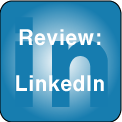 LinkedIn is a social network website that enables people to build and manage (mostly) business connections in order to discover jobs, ventures, new clients, etc. Unlike other social networking sites, its focus is business rather than social or entertainment. LinkedIn is a social network website that enables people to build and manage (mostly) business connections in order to discover jobs, ventures, new clients, etc. Unlike other social networking sites, its focus is business rather than social or entertainment.
LinkedIn is emerging as a dominant networking environment for executives and professionals, and its development will be of interest as both an immensely practical tool and as a study of the social network phenomenon. Founded in 2003, LinkedIn crossed the chasm in 2007, as the company reports that thousands of people are joining per day. Today, it has more than 9 million members, and membership is very global.
As valuable as LinkedIn is, one of the company’s weakest points is making itself approachable to executives. For example, I recently attended an Illinois IT Association Sales Round Table at which attendees represented a broad range of executives, IT management and professionals and were no strangers to developing relationships and business development. Presenter Steve Weinberg gave an excellent presentation on LinkedIn’s potential and features. Listening to the interaction of the at-capacity crowd, I was impressed by […]
Immensely Valuable Field Guide for Word of Mouth Practitioners—with a Twist
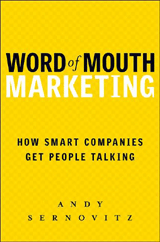 Word of Mouth Marketing is an exceptionally useful, insightful and surprising book. Andy Sernovitz has done a masterful job at creating a brief, lucid and tactical guide to realigning your company’s relationships with your customers, quickly and inexpensively. It is very straightforward, honest and full of practical techniques. Moreover, it is very human because it addresses customers as human beings, not demographics. I suspect that this aspect of the book might peeve those marketers that are invested in the difficulty and complexity of their craft. Think about it: when customers were (relatively) mute and invisible, marketers were the intermediary between the enterprise and the customer; in the absence of the customer’s voice, they created models and theories to simulate it. WOM, powered by Web 2.0, means that customers can talk in their own words, and companies can listen. The customer’s back! Word of Mouth Marketing is an exceptionally useful, insightful and surprising book. Andy Sernovitz has done a masterful job at creating a brief, lucid and tactical guide to realigning your company’s relationships with your customers, quickly and inexpensively. It is very straightforward, honest and full of practical techniques. Moreover, it is very human because it addresses customers as human beings, not demographics. I suspect that this aspect of the book might peeve those marketers that are invested in the difficulty and complexity of their craft. Think about it: when customers were (relatively) mute and invisible, marketers were the intermediary between the enterprise and the customer; in the absence of the customer’s voice, they created models and theories to simulate it. WOM, powered by Web 2.0, means that customers can talk in their own words, and companies can listen. The customer’s back!
However, this direct customer connection also means that marketing will be much more fun and less frustrating for companies that understand the shift and engage their customers. This direct, fun and productive new reality emanates from the book’s every […]
An Excellent Primer for the Core Competency of the 21st Century
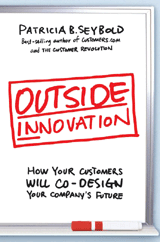 To thrive in the Knowledge Economy, companies will have to learn how to innovate at warp speed, or they will simply slip beneath the surface of the water like stricken liners. Ultra low costs and exceptional quality feature sets are merely expected, and they no longer differentiate. To thrive in the Knowledge Economy, companies will have to learn how to innovate at warp speed, or they will simply slip beneath the surface of the water like stricken liners. Ultra low costs and exceptional quality feature sets are merely expected, and they no longer differentiate.
Conventional wisdom holds that “innovation” cycles reappear every five years, when companies have exhausted the then-current cost-cutting approaches and need to focus on driving the top line.
However, the Knowledge Economy doesn’t call for your father’s innovation. The 21st century kind will require that companies turn themselves inside-out. Winners will learn to engage and catalyze their customers’ creativity. As author Patty Seybold aptly puts it, “Companies with the smartest customers win.” Outside Innovation is an in-the-trenches manual for evolving your company to embrace the innovation imperative.
[…]
We Must Rethink Learning in the Knowledge Economy
 Academicians everywhere are struggling to improve their students’ competitive standings in the global Knowledge Economy, which levels the playing field in many respects. It is far easier to build a world-class competitor in the Knowledge Economy than it was in the Industrial Economy. A strong educational system is a must, along with a highly motivated population, decent infrastructure and incentives for foreign investment. In former times, being a world competitor necessitated gaining control of vast natural resources to produce a strong industrial base from which world-class armies and navies would be built. India currently exemplifies the Knowledge Economy model very well*, and countries worldwide have taken note. Academicians everywhere are struggling to improve their students’ competitive standings in the global Knowledge Economy, which levels the playing field in many respects. It is far easier to build a world-class competitor in the Knowledge Economy than it was in the Industrial Economy. A strong educational system is a must, along with a highly motivated population, decent infrastructure and incentives for foreign investment. In former times, being a world competitor necessitated gaining control of vast natural resources to produce a strong industrial base from which world-class armies and navies would be built. India currently exemplifies the Knowledge Economy model very well*, and countries worldwide have taken note.
However, the Knowledge Economy is drastically changing what people need to learn to succeed, and educators haven’t caught up yet. They are teaching according to Industrial Economy rules, which compromises the performance of their students.
Educators have a special opportunity to create competitive advantage by realizing that the learning proposition is far different today—due to the Knowledge Economy and the role of information in adding value. The speed […]
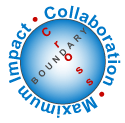 Two recent articles show that even the most intractable problems can be overcome when organizations find ways to align their goals. Sometimes collaboration makes for strange bedfellows—like the military and environmentalists—but opportunity is often highest when when “mashing up” groups that are not used to working together. Innovation can produce surprising value when leaders open their minds, challenge conventional wisdom and make unthinkable changes—like paying a hospital more for treating patients less. Two recent articles show that even the most intractable problems can be overcome when organizations find ways to align their goals. Sometimes collaboration makes for strange bedfellows—like the military and environmentalists—but opportunity is often highest when when “mashing up” groups that are not used to working together. Innovation can produce surprising value when leaders open their minds, challenge conventional wisdom and make unthinkable changes—like paying a hospital more for treating patients less.
These stories are as inspiring as they are instructive because the people involved questioned assumptions, and I hope you enjoy them.
Healthcare Costs Hit in Solar Plexus
Virginia Mason Medical Center is Seattle’s third largest health care provider, and it began innovating in several areas after receiving a wake-up call from Aetna, one of the area’s largest insurers. In 2004, Aetna shared the results of a study that compared treatment costs of Seattle area hospitals. Several of Virginia Mason’s specialty practices were significantly more costly than alternatives, and Aetna was considering excluding those areas from coverage. In the ensuing two years, Virginia Mason innovated by using new workflow strategies in targeted treatment areas. For example:
In the spine clinic, […]
A Must-read Guide to the Importance of Web 2.0 and the Knowledge Economy
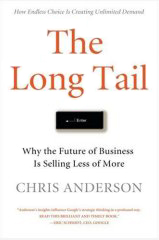 The Long Tail is a watershed book that reflects many of the profound socioeconomic changes wrought by the transition from the Industrial Economy to the Knowledge Economy. The “Long Tail” represents the splintering of the mass market—what is happening, why and how you can thrive in the new era of the niche. Moreover, it shows how the mass market was a temporary phenomenon that developed because niches were not economically viable for producers to address. The Long Tail is a watershed book that reflects many of the profound socioeconomic changes wrought by the transition from the Industrial Economy to the Knowledge Economy. The “Long Tail” represents the splintering of the mass market—what is happening, why and how you can thrive in the new era of the niche. Moreover, it shows how the mass market was a temporary phenomenon that developed because niches were not economically viable for producers to address.
Chris Anderson is editor-in-chief of Wired, and the book has an appreciation for culture, the economics of technology and the importance of innovation. It’s also very well written: Anderson tackles some fairly abstract concepts, but the reader doesn’t trip over them. It’s possible to read the book quickly, but there is plenty of substance for a detailed, reflective reading as well. Difficult to over-recommend!
The Long Tail offers an insightful look into the byte-oriented Knowledge Economy and its movement away from the zero-sum, bits-oriented Industrial Economy—and what this holds for business and culture. The book […]
Excellent guidebook for succeeding in the online world, including social networking
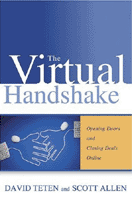 The Virtual Handshake is an immensely valuable book, both as a handbook to the virtual world for the business-oriented person and as a guide to purposeful networking. I was compelled to get it after seeing David Teten speak at a conference because he spoke with authority while explaining new things clearly. Allen and Teten have done a masterful job at writing an interesting book that is full of useful information. Moreover, they succeed at providing a conceptual framework, so the reader can make use of the information. It is also a fun read. The Virtual Handshake is an immensely valuable book, both as a handbook to the virtual world for the business-oriented person and as a guide to purposeful networking. I was compelled to get it after seeing David Teten speak at a conference because he spoke with authority while explaining new things clearly. Allen and Teten have done a masterful job at writing an interesting book that is full of useful information. Moreover, they succeed at providing a conceptual framework, so the reader can make use of the information. It is also a fun read.
As a marketing executive and a management consultant (strategy) since the early 1990s, I have helped to build parts of the virtual world the authors describe. I am very familiar with the topics, and I found the book useful on two key levels:
Conceptual: The virtual world is difficult to understand conceptually because it is boundaryless and serendipitous, and the authors describe what it is enough so you can get to the point: how to interact with it to accomplish what you want. This is extremely important […]
The Knowledge Economy, Ultimate Context for Understanding the Future welcomes you to the Post-Industrial World, which turns past assumptions on their heads.
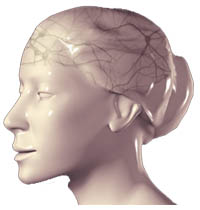 The Knowledge Economy is a post-industrial economy characterized by a highly developed information technology industry along with overproduction and commoditization in industrial and agricultural sectors. Widespread information technology (IT) adoption among producers and consumers enables all market participants to create and share information about all aspects of economic transactions. The creation, packaging and sharing of information is termed “knowledge.” In the Knowledge Economy, information about an underlying good creates most of the good’s differentiated value. The Knowledge Economy is a post-industrial economy characterized by a highly developed information technology industry along with overproduction and commoditization in industrial and agricultural sectors. Widespread information technology (IT) adoption among producers and consumers enables all market participants to create and share information about all aspects of economic transactions. The creation, packaging and sharing of information is termed “knowledge.” In the Knowledge Economy, information about an underlying good creates most of the good’s differentiated value.
Consumer mobilization and engagement in the Knowledge Economy renders many of the Industrial Economy’s rules invalid. In the Industrial Economy, consumers had little information relative to producers, they were isolated from each other, and they had no collective voice. They were at a disadvantage as market participants. The “second stage” of the Internet, “Web 2.0,” facilitates P2P (peer to peer) information sharing, and its tools are free to use and accessible to anyone with an Internet connection. Producers […]
The TransAtlantic Partnership’s Implications for U.S., E.U. Economies summarizes coverage of the EEC International Conference—Talking with the Ambassadors of the World’s Largest Trading Relationship and the CEOs of Four Global Enterprises.
 Three eminent diplomatic leaders and CEOs from Baxter, Financial Dynamics, ITW and Philips briefed Midwest executives on the current status and future directions of the world’s largest trading relationship at the Executives’ Club of Chicago’s International Conference November 15. The half-day program featured several presentations, a CEO panel and a media round table. All speakers sought to impress upon the audience the pivotal importance of the transatlantic alliance for the United States and Europe, and most warned chief executives neither to take it for granted nor to be passive in the face of rising protectionism. Three eminent diplomatic leaders and CEOs from Baxter, Financial Dynamics, ITW and Philips briefed Midwest executives on the current status and future directions of the world’s largest trading relationship at the Executives’ Club of Chicago’s International Conference November 15. The half-day program featured several presentations, a CEO panel and a media round table. All speakers sought to impress upon the audience the pivotal importance of the transatlantic alliance for the United States and Europe, and most warned chief executives neither to take it for granted nor to be passive in the face of rising protectionism.
The fact that the importance of the E.U.—U.S. alliance had to be emphasized brought into sharp relief the relatively sudden rise of Asia as well as the shift from the Industrial Economy to the Knowledge Economy. Both megatrends pose opportunities and threats for the world’s largest economies and enterprises, and […]
Advice from three successful CIOs
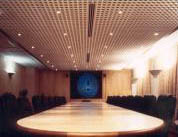 In the past 15 years, “enterprise IT” has been transformed from an accounting support function to the driver-enabler for innovation and value creation. By no means has this been a smooth transformation, as businesses in all industries are besieged by globalization, new competitors and rampant commoditization. At many companies, executives around the boardroom table have had mixed feelings about IT in the face of huge expenditures and uncertain ROIs. In the past 15 years, “enterprise IT” has been transformed from an accounting support function to the driver-enabler for innovation and value creation. By no means has this been a smooth transformation, as businesses in all industries are besieged by globalization, new competitors and rampant commoditization. At many companies, executives around the boardroom table have had mixed feelings about IT in the face of huge expenditures and uncertain ROIs.
At the Executives’ Club of Chicago High Technology Conference last week, Michael S. Carlin of Hospira, Richard Shellito of State Farm Insurance and Randy G. Burdick of OfficeMax shared their advice on keeping IT relevant in the boardroom. After their prepared remarks, Winifred A. Gillen of Capgemini moderated the panel during a Q&A session.
[…]
|
|
 LinkedIn is a social network website that enables people to build and manage (mostly) business connections in order to discover jobs, ventures, new clients, etc. Unlike other social networking sites, its focus is business rather than social or entertainment.
LinkedIn is a social network website that enables people to build and manage (mostly) business connections in order to discover jobs, ventures, new clients, etc. Unlike other social networking sites, its focus is business rather than social or entertainment.
 Word of Mouth Marketing is an exceptionally useful, insightful and surprising book. Andy Sernovitz has done a masterful job at creating a brief, lucid and tactical guide to realigning your company’s relationships with your customers, quickly and inexpensively. It is very straightforward, honest and full of practical techniques. Moreover, it is very human because it addresses customers as human beings, not demographics. I suspect that this aspect of the book might peeve those marketers that are invested in the difficulty and complexity of their craft. Think about it: when customers were (relatively) mute and invisible, marketers were the intermediary between the enterprise and the customer; in the absence of the customer’s voice, they created models and theories to simulate it. WOM, powered by Web 2.0, means that customers can talk in their own words, and companies can listen. The customer’s back!
Word of Mouth Marketing is an exceptionally useful, insightful and surprising book. Andy Sernovitz has done a masterful job at creating a brief, lucid and tactical guide to realigning your company’s relationships with your customers, quickly and inexpensively. It is very straightforward, honest and full of practical techniques. Moreover, it is very human because it addresses customers as human beings, not demographics. I suspect that this aspect of the book might peeve those marketers that are invested in the difficulty and complexity of their craft. Think about it: when customers were (relatively) mute and invisible, marketers were the intermediary between the enterprise and the customer; in the absence of the customer’s voice, they created models and theories to simulate it. WOM, powered by Web 2.0, means that customers can talk in their own words, and companies can listen. The customer’s back! To thrive in the Knowledge Economy, companies will have to learn how to innovate at warp speed, or they will simply slip beneath the surface of the water like stricken liners. Ultra low costs and exceptional quality feature sets are merely expected, and they no longer differentiate.
To thrive in the Knowledge Economy, companies will have to learn how to innovate at warp speed, or they will simply slip beneath the surface of the water like stricken liners. Ultra low costs and exceptional quality feature sets are merely expected, and they no longer differentiate. Academicians everywhere are struggling to improve their students’ competitive standings in the global Knowledge Economy, which levels the playing field in many respects. It is far easier to build a world-class competitor in the Knowledge Economy than it was in the Industrial Economy. A strong educational system is a must, along with a highly motivated population, decent infrastructure and incentives for foreign investment. In former times, being a world competitor necessitated gaining control of vast natural resources to produce a strong industrial base from which world-class armies and navies would be built. India currently exemplifies the Knowledge Economy model very well*, and countries worldwide have taken note.
Academicians everywhere are struggling to improve their students’ competitive standings in the global Knowledge Economy, which levels the playing field in many respects. It is far easier to build a world-class competitor in the Knowledge Economy than it was in the Industrial Economy. A strong educational system is a must, along with a highly motivated population, decent infrastructure and incentives for foreign investment. In former times, being a world competitor necessitated gaining control of vast natural resources to produce a strong industrial base from which world-class armies and navies would be built. India currently exemplifies the Knowledge Economy model very well*, and countries worldwide have taken note. Two recent articles show that even the most intractable problems can be overcome when organizations find ways to align their goals. Sometimes collaboration makes for strange bedfellows—like the military and environmentalists—but opportunity is often highest when when “mashing up” groups that are not used to working together. Innovation can produce surprising value when leaders open their minds, challenge conventional wisdom and make unthinkable changes—like paying a hospital more for treating patients less.
Two recent articles show that even the most intractable problems can be overcome when organizations find ways to align their goals. Sometimes collaboration makes for strange bedfellows—like the military and environmentalists—but opportunity is often highest when when “mashing up” groups that are not used to working together. Innovation can produce surprising value when leaders open their minds, challenge conventional wisdom and make unthinkable changes—like paying a hospital more for treating patients less. The Long Tail is a watershed book that reflects many of the profound socioeconomic changes wrought by the transition from the Industrial Economy to the Knowledge Economy. The “Long Tail” represents the splintering of the mass market—what is happening, why and how you can thrive in the new era of the niche. Moreover, it shows how the mass market was a temporary phenomenon that developed because niches were not economically viable for producers to address.
The Long Tail is a watershed book that reflects many of the profound socioeconomic changes wrought by the transition from the Industrial Economy to the Knowledge Economy. The “Long Tail” represents the splintering of the mass market—what is happening, why and how you can thrive in the new era of the niche. Moreover, it shows how the mass market was a temporary phenomenon that developed because niches were not economically viable for producers to address. The Virtual Handshake is an immensely valuable book, both as a handbook to the virtual world for the business-oriented person and as a guide to purposeful networking. I was compelled to get it after seeing David Teten speak at a conference because he spoke with authority while explaining new things clearly. Allen and Teten have done a masterful job at writing an interesting book that is full of useful information. Moreover, they succeed at providing a conceptual framework, so the reader can make use of the information. It is also a fun read.
The Virtual Handshake is an immensely valuable book, both as a handbook to the virtual world for the business-oriented person and as a guide to purposeful networking. I was compelled to get it after seeing David Teten speak at a conference because he spoke with authority while explaining new things clearly. Allen and Teten have done a masterful job at writing an interesting book that is full of useful information. Moreover, they succeed at providing a conceptual framework, so the reader can make use of the information. It is also a fun read. The Knowledge Economy is a post-industrial economy characterized by a highly developed information technology industry along with overproduction and commoditization in industrial and agricultural sectors. Widespread information technology (IT) adoption among producers and consumers enables all market participants to create and share information about all aspects of economic transactions. The creation, packaging and sharing of information is termed “knowledge.” In the Knowledge Economy, information about an underlying good creates most of the good’s differentiated value.
The Knowledge Economy is a post-industrial economy characterized by a highly developed information technology industry along with overproduction and commoditization in industrial and agricultural sectors. Widespread information technology (IT) adoption among producers and consumers enables all market participants to create and share information about all aspects of economic transactions. The creation, packaging and sharing of information is termed “knowledge.” In the Knowledge Economy, information about an underlying good creates most of the good’s differentiated value. Three eminent diplomatic leaders and CEOs from Baxter, Financial Dynamics, ITW and Philips briefed Midwest executives on the current status and future directions of the world’s largest trading relationship at the Executives’ Club of Chicago’s International Conference November 15. The half-day program featured several presentations, a CEO panel and a media round table. All speakers sought to impress upon the audience the pivotal importance of the transatlantic alliance for the United States and Europe, and most warned chief executives neither to take it for granted nor to be passive in the face of rising protectionism.
Three eminent diplomatic leaders and CEOs from Baxter, Financial Dynamics, ITW and Philips briefed Midwest executives on the current status and future directions of the world’s largest trading relationship at the Executives’ Club of Chicago’s International Conference November 15. The half-day program featured several presentations, a CEO panel and a media round table. All speakers sought to impress upon the audience the pivotal importance of the transatlantic alliance for the United States and Europe, and most warned chief executives neither to take it for granted nor to be passive in the face of rising protectionism. In the past 15 years, “enterprise IT” has been transformed from an accounting support function to the driver-enabler for innovation and value creation. By no means has this been a smooth transformation, as businesses in all industries are besieged by globalization, new competitors and rampant commoditization. At many companies, executives around the boardroom table have had mixed feelings about IT in the face of huge expenditures and uncertain ROIs.
In the past 15 years, “enterprise IT” has been transformed from an accounting support function to the driver-enabler for innovation and value creation. By no means has this been a smooth transformation, as businesses in all industries are besieged by globalization, new competitors and rampant commoditization. At many companies, executives around the boardroom table have had mixed feelings about IT in the face of huge expenditures and uncertain ROIs.